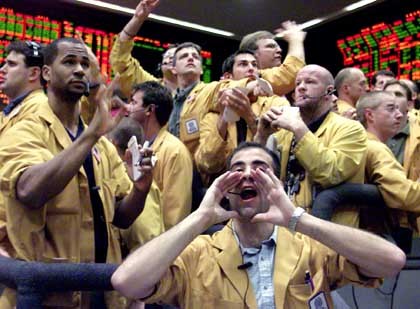An Overview Of Commodities Trading_1
Post on: 9 Апрель, 2015 No Comment

Commodities markets, both historically and in modern times, have had tremendous economic impact on nations and people. The impact of commodity markets throughout history is still not fully known, but it has been suggested that rice futures may have been traded in China as long ago as 6,000 years. Shortages on critical commodities have sparked wars throughout history (such as in World War II, when Japan ventured into foreign lands to secure oil and rubber), while oversupply can have a devastating impact on a region by devaluing the prices of core commodities.
Energy commodities such as crude are closely watched by countries, corporations and consumers alike. The average Western consumer can become significantly impacted by high crude prices. Alternatively, oil-producing countries in the Middle East (that are largely dependent on petrodollars as their source of income) can become adversely affected by low crude prices. Unusual disruptions caused by weather or natural disasters can not only be an impetus for price volatility, but can also cause regional food shortages. Read on to find out about the role that various commodities play in the global economy and how investors can turn economic events into opportunities.
Commodities 101
The four categories of trading commodities include:
- Energy (including crude oil, heating oil, natural gas and gasoline)
- Metals (including gold, silver, platinum and copper)
- Livestock and Meat (including lean hogs, pork bellies, live cattle and feeder cattle)
- Agricultural (including corn, soybeans, wheat, rice, cocoa, coffee, cotton and sugar)
Ancient civilizations traded a wide array of commodities, including livestock, seashells, spices and gold. Although the quality of product, date of delivery and transportation methods were often unreliable, commodity trading was an essential business. The might of empires can be viewed as somewhat proportionate to their ability to create and manage complex trading systems and facilitate commodity trades, as these served as the wheels of commerce, economic development and taxation for the kingdom’s treasuries. Reputation and reliability were critical underpinnings to secure the trust of ancient investors, traders and suppliers.
Investment Characteristics
Commodity trading in the exchanges can require agreed-upon standards so that trades can be executed (without visual inspection). You don’t want to buy 100 units of cattle only to find out that the cattle are sick, or discover that the sugar purchased is of inferior or unacceptable quality.
There are other ways in which trading and investing in commodities can be very different from investing in traditional securities such as stocks and bonds. Global economic development, technological advances and market demands for commodities influence the prices of staples such as oil, aluminum, copper, sugar and corn. For instance, the emergence of China and India as significant economic players has contributed to the declining availability of industrial metals, such as steel, for the rest of the world.
Basic economic principles typically follow the commodities markets: lower supply equals higher prices. For instance, investors can follow livestock patterns and statistics. Major disruptions in supply, such as widespread health scares and diseases, can lead to investing plays, given that the long-term demand for livestock is generally stable and predictable.














